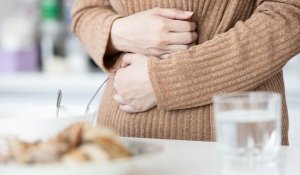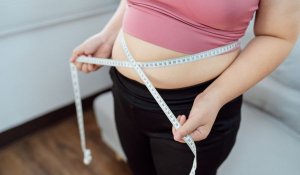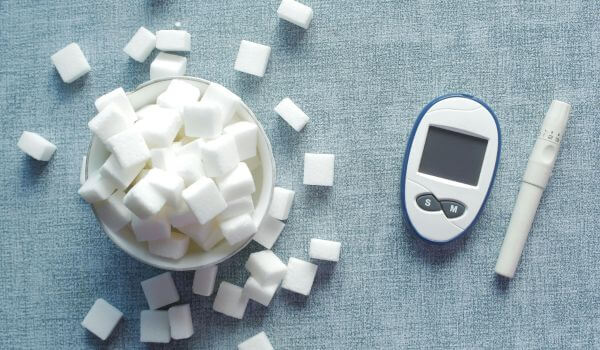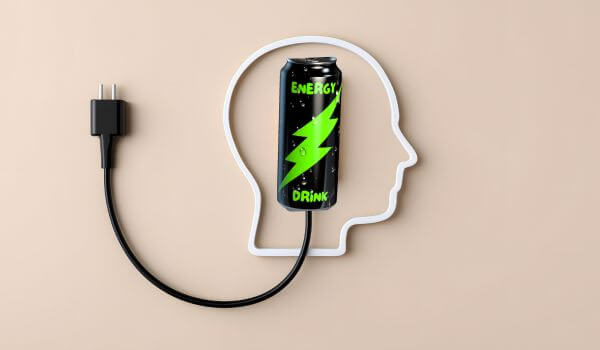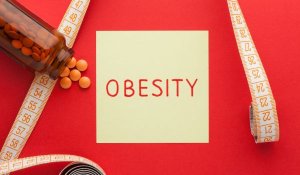 While I do not fit the exact criteria for obesity, I have definitely had times where my excess body fat has significantly increased. Whether that was because of health conditions, prolonged bouts of being a bit too sedentary, or when I spent three weeks in Italy and had a minimum of two gelatos daily, I noticed one thing each time. I would get pretty debilitating acid reflux. I am somewhat prone to this when I’m in what is considered a healthy weight range, but then it only pops up when I have trigger foods, such as coffee or red wine. When my weight is up, it seems the reflux comes after almost anything I eat, and it turns out that there are good reasons as to why that happens.
While I do not fit the exact criteria for obesity, I have definitely had times where my excess body fat has significantly increased. Whether that was because of health conditions, prolonged bouts of being a bit too sedentary, or when I spent three weeks in Italy and had a minimum of two gelatos daily, I noticed one thing each time. I would get pretty debilitating acid reflux. I am somewhat prone to this when I’m in what is considered a healthy weight range, but then it only pops up when I have trigger foods, such as coffee or red wine. When my weight is up, it seems the reflux comes after almost anything I eat, and it turns out that there are good reasons as to why that happens.
Obesity is a major risk factor for many health problems, including gastrointestinal (GI) disorders. It can make these conditions worse by increasing the severity of the disease and affecting how treatments work. This is because excess body fat can cause inflammation and other changes in the body that lead to cell damage and dysfunction. It can also cause issues like extra pressure on GI organs. Obesity-related GI disorders are becoming more common as obesity rates rise. Let’s look at a few GI disorders that can be triggered or worsened by obesity.
Gastroesophageal reflux disease (GERD)
Gastroesophageal reflux occurs when stomach acid flows back into the esophagus, the tube that links the mouth to the stomach. When someone is obese, extra belly fat can increase pressure in the abdomen. This pressure can cause the lower esophageal sphincter, a muscle that keeps stomach acid in place, to relax. As a result, acid can move back up into the esophagus, causing reflux.
A review from 2021 explains that obesity is connected to GERD and can raise the chances of developing it for several reasons:
- People who are obese have a higher chance of getting a hiatal hernia. This happens when the top part of the stomach pushes through a weak spot in the diaphragm, the muscle that separates the chest from the abdomen.
- Extra weight around the belly can put more pressure inside the abdomen. This added pressure makes it easier for stomach contents to flow back into the esophagus.
- People with obesity often have more visceral fat, which is the fat stored around their internal organs. Researchers have discovered that this type of fat releases certain chemicals called adipocytokines. Some of these chemicals may play a role in causing GERD and even certain types of esophageal cancer.
What medications can help with heartburn?
There are multiple medications available to treat heartburn.
- Antacids can be used for symptom relief. These work by neutralizing stomach acid to relieve heartburn. Common examples include Gaviscon and Tums.
- H2 Blockers are medicines that lower the amount of acid the stomach makes and start working within a few hours. Examples include Cimetidine and Famotidine (Pepcid)
- Proton pump inhibitors (PPIs) are medicines that lower the amount of acid the stomach makes. They usually take longer to start working than H2 blockers, often between one and four days. Some common PPIs include Lansoprazole (Prevacid), Esomeprazole (Nexium), Omeprazole magnesium (Prilosec), and Omeprazole with sodium bicarbonate.
Gallstone disease
Gallstones are solid lumps that form in the gallbladder, a small organ located under the liver in the upper right part of the abdomen. These stones can vary in size, from tiny specks to as big as a golf ball. A person might have just one gallstone or many at the same time. Some gallstones cause no symptoms, while others can lead to severe pain.
Gallstones form when bile, a substance that helps digest fat, has too much cholesterol or bilirubin and not enough bile acids or other substances that help mix fats and liquids. The most common type of gallstones is made of cholesterol, but some are made from bilirubin, known as pigment gallstones.
Obesity can cause gallstones because it changes the balance of cholesterol, lecithin, and bile acids in the gallbladder. Extra body weight can also make it harder for the gallbladder to empty properly. When this happens, bile with high cholesterol levels can build up and form stones.
How to lose weight safely to reduce the risk of gallstones?
Losing extra weight can help lower the risk of gallstones. Experts recommend losing weight slowly and steadily instead of trying crash diets, as rapid weight loss can lead to gallstones. This happens because it changes the balance of cholesterol, bile acids, and lecithin in the body.
People who go through bariatric surgery are more likely to develop gallstones because they often lose a lot of weight quickly in the first three to six months. To help prevent this, doctors often prescribe a medicine called Actigall. It works by reducing cholesterol levels and breaking them down in the bile.
Colon cancer
Carrying extra body weight has been linked to a higher risk of developing colon cancer. Studies show that as body mass index (BMI) increases, so does the chance of getting colorectal cancer. Research published in The Lancet found that for every 5 kg/m² increase in BMI, the risk of colon cancer goes up by about 18% in men and 14% in women. This risk is even higher for people with obesity because long-term problems with their metabolism can lead to the growth and spread of tumors.
How does excess body fat increase the risk of colon cancer?
Excess body fat, especially the kind around internal organs, releases substances that affect how cells grow. One of these, leptin, can cause colon cells to grow faster. At the same time, lower levels of a hormone called adiponectin, which helps fight inflammation and prevent tumors, reduce an important defense against abnormal cell growth. This imbalance can lead to changes in DNA and how genes work, raising the chances of developing cancer.
Obesity also changes the environment in the colon in ways that can lead to cancer. Extra body fat puts pressure on the intestines, slowing down digestion and keeping harmful substances in contact with colon cells longer. Obesity also increases the production of bile acids, which can harm the intestine and cause DNA damage.

Obesity can also affect the body’s metabolism and hormones, increasing the risk of colon cancer. When someone has too much body fat, it can cause insulin resistance, which makes the pancreas produce more insulin and a hormone called IGF-1. IGF-1 can trigger processes in the body that help tumors grow and survive. Research shows that people with higher levels of IGF-1 in their blood are more likely to develop colorectal cancer, highlighting the connection between metabolic issues and cancer development.
Can probiotics reduce the risk of colon cancer?
The bacteria in the gut also play a role in keeping the colon healthy, and changes in these bacteria have been linked to a higher risk of colon cancer. Bacteria in the gut produce substances called metabolites, and these can affect cancer risk. Some, like short-chain fatty acids (SCFAs) such as butyrate, help protect the gut lining and reduce inflammation. However, people with obesity tend to produce fewer SCFAs. Instead, they have higher levels of harmful substances like secondary bile acids and lipopolysaccharides, which can damage gut cells and cause DNA changes. Regularly taking supplements containing good bacteria called probiotics can increase the production of SCFAs and improve the health of the gut.
Diverticulitis
Diverticulitis is another condition linked to obesity, although the exact reasons aren’t fully understood. Factors like a poor diet, lack of exercise, and changes in gut bacteria may play a role. Diverticulitis happens when small pouches, called diverticula, form in the lining of the digestive system, usually in the colon. If these pouches become swollen or infected, they lead to the painful condition known as diverticulitis. This condition can lead to strong stomach pain, fever, nausea, and major problems with normal bowel movements.
Although diverticulitis cannot always be avoided, making some lifestyle changes can help lower the risk. Eating a high-fiber diet with plenty of fruits, vegetables, and whole grains supports healthy digestion and reduces pressure on the colon. Staying hydrated also helps fiber move through the digestive system more easily. Regular exercise not only improves digestion but also helps prevent constipation. Avoiding smoking and limiting alcohol can also reduce the chances of developing the condition and its complications.
Metabolic dysfunction-associated steatotic liver disease (MASLD)
Metabolic dysfunction-associated steatotic liver disease (MASLD) is closely linked to higher body weight and can lead to liver problems like inflammation, known as metabolic dysfunction-associated steatohepatitis (MASH). Over time, this can result in liver damage such as cirrhosis and even liver cancer.
MASLD, previously known as nonalcoholic fatty liver disease (NAFLD), occurs when fat builds up in the liver, often affecting people with obesity or Type 2 diabetes. Managing MASLD typically starts with weight loss, as shedding excess body fat can help reduce fat in the liver, lower inflammation, and prevent serious complications like cirrhosis. Staying active and adopting healthy eating habits, such as following the Mediterranean or DASH diets, can significantly improve liver health. Doctors may also focus on treating related conditions like diabetes, high cholesterol, and high blood pressure, which are common contributors to MASLD.
Lifestyle changes for a healthy gut
- Exercising regularly can help lower the risk of GI disorders. Staying active with vigorous exercise is good for overall health and your digestive system.
- Eating enough fiber is necessary for gut health. Foods like fruits, vegetables, whole grains, beans, and seeds help waste move through the colon more easily, reducing the chances of conditions such as diverticulitis. At the same time, cutting back on red meat and sugary foods is recommended.
- Drinking plenty of water is important too. Fiber works best when it absorbs water, which helps create softer, bulkier waste. This makes it easier for the colon to move waste and prevents constipation.
Aside from diet and exercise, what are some other effective weight loss treatments for obesity?
Weight loss medication
Doctors might suggest weight loss medications, such as GLP-1 agonists, for people with obesity. These medications can help control blood sugar levels and support weight loss. Some common options include:
- Semaglutide (sold as Ozempic or Wegovy)
- Liraglutide (sold as Victoza or Saxenda)
- Tirzepatide (sold as Mounjaro or Zepbound)
Bariatric surgery
A doctor might talk about bariatric surgery as a way to help with weight loss. This type of surgery involves making changes to the stomach and/or small intestine to limit food intake or absorption.
Frequently Asked Questions
Can you reverse MASLD?
Whether treatment can reverse MASLD depends on the person’s situation. In most cases, it can be reversed unless the person has MASH-related cirrhosis. Catching the condition early can prevent serious damage to the liver. Actions like losing weight may help reverse the effects of MASLD, but the outcome depends on the person’s overall health. It’s important to talk to a doctor to see if weight loss could improve their condition.
How does losing weight help with heartburn?
Losing extra weight can reduce belly fat. This helps take pressure off the stomach and the lower esophageal sphincter, which could help reduce GERD symptoms.
Losing weight can help reduce the amount of visceral fat in the body. This may lower the release of certain chemicals from fat cells and decrease the risk of acid reflux and other esophagus-related problems.
How much weight loss helps reflux?
Losing just 5-10% of body weight can lead to a significant improvement in GERD symptoms and a noticeable reduction in overall GERD scores. For women in particular, studies indicate that this reduction of excess body fat is enough to achieve statistically significant improvements (P < 0.05).
Can probiotics treat obesity?
Probiotics can help with the reduction of excess body fat and improve metabolism by making substances like short-chain fatty acids (SCFAs). These substances affect the connection between the gut, brain, and microbes, which can also boost brain function.

